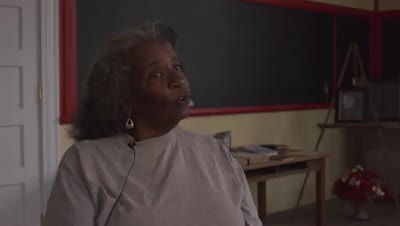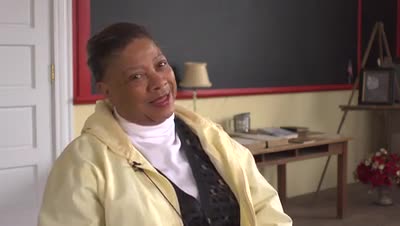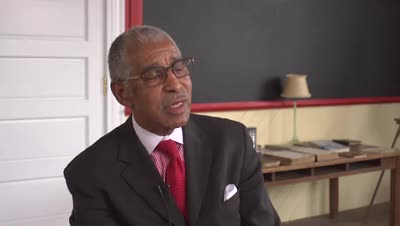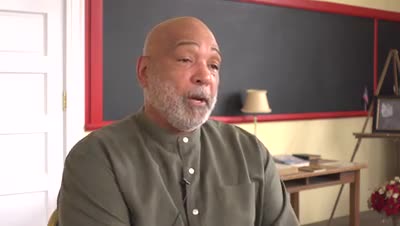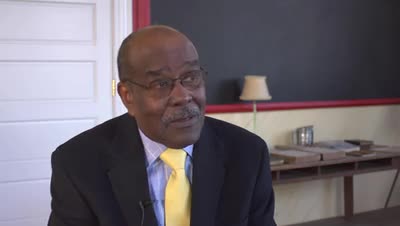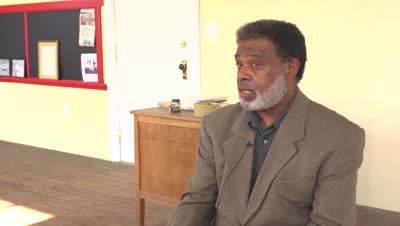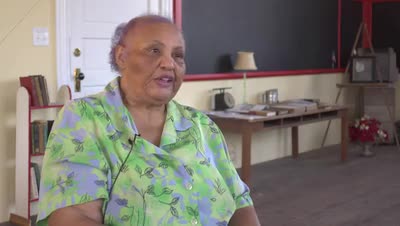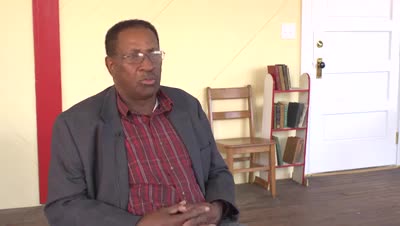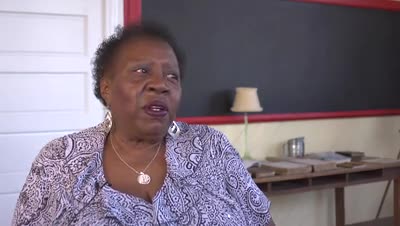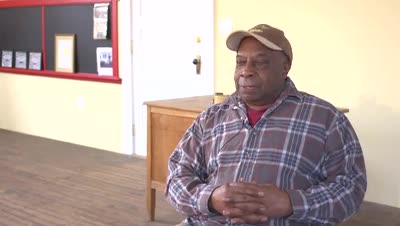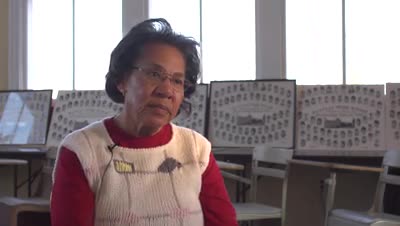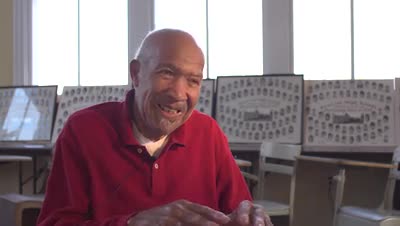Goochland County Rosenwald Schools oral history project, 2013-2015
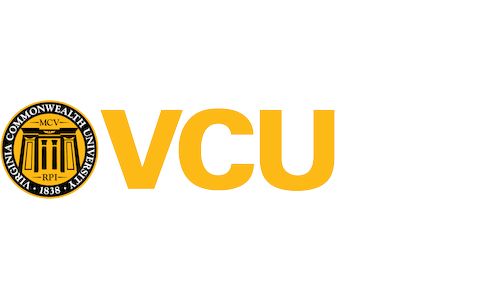
The purpose of the project is to document education in Goochland County, Virginia, particularly the impact of the Rosenwald Schools, and the differences between the education offered to white and black students during the period the Rosenwald Schools operated.
More About This Collection
Date of Original
1922/2014
Subject
Oral histories
Julius Rosenwald Fund--Buildings
African American schools--Virginia--Goochland County
Goochland County (Va.)--Race relations
African Americans--Education--Virginia--Goochland County
African American schools--Curricula--Virginia--Goochland County
Goochland County (Va.)--Buildings, structures, etc.
School buildings--Virginia--Goochland County
African American teachers--Virginia--Goochland County
Segregation in education--Virginia--Goochland County
Community activists--Virginia--Goochland County
African American schools--Museums--Virginia--Goochland County
School integration--Virginia--Goochland County
African American neighborhoods--Virginia--Goochland County
People
Bowles, James Harold--Interviews
Bowles, Vivian Knight--Interviews
Johnson, Ruth Cooke--Interviews
Pace, Earline--Interviews
Anderson, Francis--Interviews
Anthony, Eva--Interviews
Bowles, James Harold--Childhood and youth--Anecdotes
Dun-Moodie, Ina--Interviews
Haden, Joseph--Interviews
Hopkins, Calvin--Interviews
Johnson, Mattie Lee Harris--Interviews
Miller, Raymond A.--Interviews
Pace, Haywood--Interviews
Parrish, Alberta--Interviews
Parrish, Curtis--Interviews
Parrish, Phyllis--Interviews
Smith, Gail P.--Interviews
Ware, Sherman--Interviews
Anderson, Francis--Childhood and youth--Anecdotes
Anthony, Eva--Childhood and youth--Anecdotes
Bowles, James Harold--Political activity
Bowles, Vivian Knight--Childhood and youth--Anecdotes
Dun-Moodie, Ina--Childhood and youth--Anecdotes
Haden, Joseph--Childhood and youth--Anecdotes
Hopkins, Calvin--Childhood and youth--Anecdotes
Johnson, Mattie Lee Harris--Childhood and youth--Anecdotes
Johnson, Ruth Cooke--Childhood and youth--Anecdotes
Miller, Raymond A.--Childhood and youth--Anecdotes
Pace, Earline--Childhood and youth--Anecdotes
Pace, Haywood--Childhood and youth--Anecdotes
Parrish, Alberta--Childhood and youth--Anecdotes
Parrish, Curtis--Childhood and youth--Anecdotes
Parrish, Phyllis--Childhood and youth--Anecdotes
Quarles, William, Jr.--Childhood and youth--Anecdotes
Quarles, William, Jr.--Interviews
Smith, Gail P.--Childhood and youth--Anecdotes
Ware, Sherman--Childhood and youth--Anecdotes
Location
United States, Virginia, Goochland County, 37.72198, -77.91636
Medium
oral histories (literary works)
Type
MovingImage
Sound
Text
Description
The Goochland County Rosenwald Schools Oral History Project is a joint venture by Dr. Brian J. Daugherity of Virginia Commonwealth University and Dr. Alyce Miller of John Tyler Community College. The purpose of the project is to document education in Goochland County, Virginia, particularly the impact of the Rosenwald Schools, and the differences between the education offered to white and black students during the period the Rosenwald Schools operated. The project was funded in part by a grant from the Virginia Foundation for Humanities, the John Tyler Community College Foundation, and the Virginia Community College System.
During the Jim Crow Era, from roughly the 1870s until the 1950s, segregated school systems were supposed to be, according to the U.S. Supreme Court in Plessy v. Ferguson (1896), “separate but equal.” In reality, educational systems for African Americans in Virginia, and elsewhere in the South, were anything but. Starting in the 1910s, “Rosenwald Schools” were constructed for black students as a philanthropic endeavor funded in part by businessman and philanthropist Julius Rosenwald. While Rosenwald provided the matching grant funds that supported the program, Booker T. Washington was the initial force behind its creation. The Rosenwald schoolbuilding program began in 1912 when Booker T. Washington asked permission to use some of the money Rosenwald had donated to the Tuskegee Institute to construct several small schools in rural Alabama.
Over a 15 year period, from 1917 to 1932, 4,977 schools, primarily for African Americans, were funded and built. According to Julius Rosenwald Fund records (JRF), the JRF helped construct 367 schools, three teacher’s homes, and eleven school (industrial) shops in Virginia. In addition to providing its own money, the Rosenwald Fund required matching funds from any combination of public and private sources. Of the total cost of Rosenwald-associated buildings, grounds, and equipment in Virginia from 1917 through 1932, African Americans contributed 22%, white contributions totaled 1%, the Rosenwald Fund contributed 15%, and state and local government contributions equaled 62%. In the fifteen states in the South where the school building program operated, African Americans collectively contributed 17% of the funds, the Rosenwald Fund contributed 15% of the funds, private white contributions totaled 4% of the funds, and public funds made up the remaining 64% of the funds.
The majority of the private funding for Rosenwald Schools came from the African American communities where the schools were located, because black citizens organized fundraisers and sacrificed some of their own, often meager, wages in support of a better education for their children.
Rosenwald Schools were built using architectural plans provided by the Rosenwald Fund. Most of the schools were constructed in rural communities that were unlikely to have access to electricity, so they were designed to take the most advantage of natural light. They also had strict guidelines regarding ventilation, interior and exterior color schemes and decorative appointments, the quality of the furnishings and blackboards, and the location of separate outhouses. Often, the walls separating classrooms were moveable to enable the community to create a larger meeting space as needed.
The Goochland County Rosenwald Schools Oral History digital collection consists of 19 video interviews with 18 participants with fully searchable transcripts and tape logs for 15 of the interviews. Additionally, photographs of the schools and documents relating to the Rosenwald Fund are included.
Language
eng
Contributing Institution
James Branch Cabell Library. Special Collections and Archives
